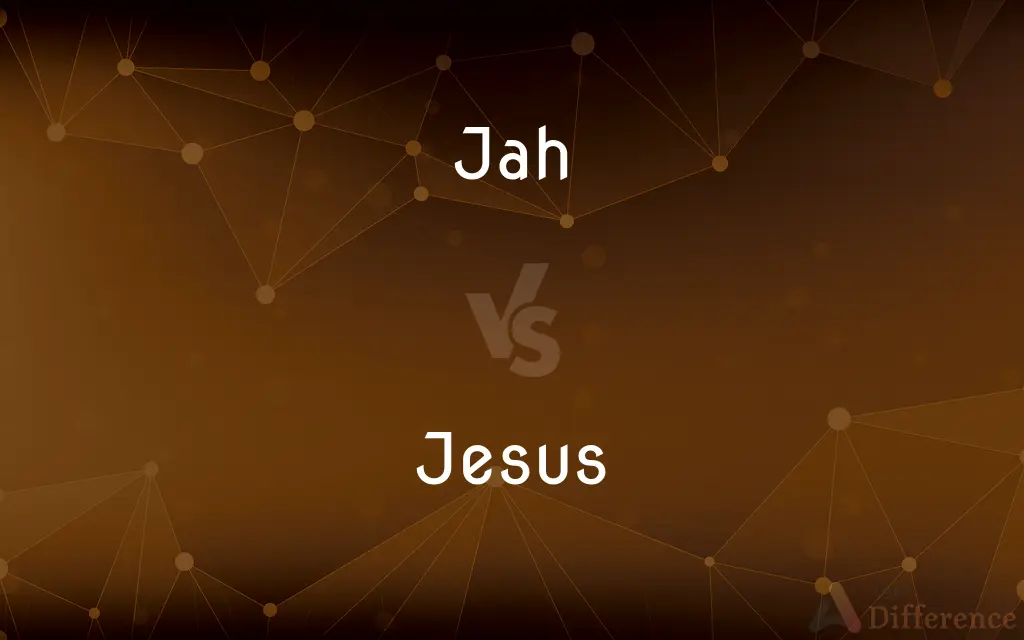Jah vs. Jesus — What's the Difference?
Edited by Tayyaba Rehman — By Fiza Rafique — Updated on April 1, 2024
Jah is a term for God in Rastafarianism, emphasizing an immanent presence, while Jesus is central in Christianity as the Son of God and savior.

Difference Between Jah and Jesus
Table of Contents
ADVERTISEMENT
Key Differences
Jah, derived from Jehovah, is used within Rastafarianism to refer to the singular God, highlighting a God that is present within each individual and directly involved in the world. This term reflects the Rastafarian belief in living a life that is always in the presence of God, with an emphasis on the spiritual connection between the individual and the divine. On the other hand, Jesus is recognized in Christianity as the Son of God, whose life, and resurrection are foundational to Christian faith. Jesus is worshipped and followed as the savior of humanity, and his teachings form the basis of Christian moral and spiritual guidance.
Rastafarianism views Jah as a living God who actively influences the lives of believers and the world around them, often identifying the late Ethiopian Emperor Haile Selassie I as a representation of Jah on Earth. In contrast, Christians view Jesus not only as a historical figure but also as a divine presence that continues to influence the world through the Holy Spirit, emphasizing his role in salvation and eternal life.
The concept of Jah in Rastafarianism is tightly linked to themes of liberation and resistance against oppression, reflecting the movement's origins among African descendants in Jamaica. This contrasts with the broader Christian narrative where Jesus' message is one of universal love, redemption, and the establishment of the Kingdom of God, transcending any single culture or historical context.
Rastafarianism and Christianity, while sharing some biblical roots, diverge significantly in their portrayal and understanding of the divine. Jah's representation draws heavily from Old Testament descriptions of God and is intertwined with the struggle for freedom and identity among its followers. Meanwhile, Jesus' teachings in the New Testament focus on love, forgiveness, and the path to salvation, appealing to a global audience across various cultures and epochs.
Both Jah and Jesus embody the idea of divine intervention in human affairs, but they represent vastly different interpretations and responses to the divine. Rastafarianism's Jah emphasizes a God that is immediately present and accessible, advocating for social justice and empowerment. In contrast, Jesus' life in Christianity offers a model for personal sacrifice, spiritual rebirth, and the promise of eternal life, emphasizing personal transformation and the hope of redemption.
ADVERTISEMENT
Comparison Chart
Definition
Term for God in Rastafarianism, emphasizing an immanent divine presence.
Central figure in Christianity, considered the Son of God and humanity's savior.
Beliefs
Represents a living God directly involved in the world and individual lives.
Worshiped for his teachings, sacrifice, and role in salvation and eternal life.
Representation
Often associated with Haile Selassie I as a messianic figure on Earth.
Seen as both a historical figure and a divine presence influencing the world through the Holy Spirit.
Themes
Liberation, resistance against oppression, and the personal connection with the divine.
Love, redemption, universal salvation, and the establishment of the Kingdom of God.
Spiritual Focus
Immediate presence of God, social justice, and empowerment.
Personal sacrifice, spiritual rebirth, hope, and redemption.
Compare with Definitions
Jah
Symbol of resistance and empowerment within Rastafarian belief.
Jah is seen as a beacon of hope against injustice.
Jesus
Central to Christianity as the Son of God and savior of humanity.
Christians follow the teachings of Jesus to lead a life of virtue.
Jah
The Rastafarian name for God, emphasizing His presence in every aspect of life.
Rastafarians pray to Jah for guidance and strength.
Jesus
Embodies the promise of eternal life and redemption.
Belief in Jesus offers Christians the hope of eternal salvation.
Jah
Represents a direct, personal connection with the divine.
Through music and prayer, they feel closer to Jah.
Jesus
His life, resurrection are foundational to Christian faith.
The resurrection of Jesus is celebrated at Easter.
Jah
Associated with the figure of Haile Selassie I by Rastafarians.
Jah Rastafari is often equated with Haile Selassie, revered as a godly figure.
Jesus
Represents love, forgiveness, and the path to salvation.
Jesus' message of universal love transcends cultural boundaries.
Jah
A term that encapsulates the living God's influence in the world.
Jah's guidance is sought in times of hardship.
Jesus
Viewed as both a historical figure and a divine presence.
The gospels document the life and teachings of Jesus.
Jah
Jah or Yah (Hebrew: יָהּ, Yāh) is a short form of יהוה (YHWH), the four letters that form the tetragrammaton, the personal name of God: Yahweh, which the ancient Israelites used. The conventional Christian English pronunciation of Jah is , even though the letter J here transliterates the palatal approximant (Hebrew י Yodh).
Jesus
Jesus (Greek: Ἰησοῦς, romanized: Iēsoûs, likely from Hebrew/Aramaic: יֵשׁוּעַ, romanized: Yēšūaʿ), c. 4 BC – AD 30 / 33, also referred to as Jesus of Nazareth or Jesus Christ, was a first-century Jewish preacher from Judea. He is the central figure of Christianity, the world's largest religion.
Jah
A biblical form of the name of God (Yahweh), used especially in Rastafarianism.
Jesus
The central figure of the Christian religion.
Jah
Jehovah.
Jesus
The Savior; the name of the Son of God as announced by the angel to his parents; the personal name of Our Lord, in distinction from Christ, his official appellation.
Thou shalt call his name Jesus; for he shall save his people from their sins.
Jesu, do thou my soul receive.
Jesus
AD 29)
Common Curiosities
Who is Jah in Rastafarianism?
Jah is the term for God in Rastafarianism, emphasizing a direct, personal connection with the divine and active divine presence in the world.
How do Rastafarians view Haile Selassie I in relation to Jah?
Many Rastafarians view Haile Selassie I as a representation of Jah on Earth, seeing his reign as fulfilling biblical prophecy and his persona as messianic.
How does Jesus' message differ from the Rastafarian view of Jah?
Jesus’ message focuses on universal love, forgiveness, redemption, and the promise of eternal life, contrasting with Rastafarianism’s emphasis on liberation, divine presence, and resistance against oppression.
What does Jesus represent in Christianity?
Jesus is the central figure in Christianity, revered as the Son of God, whose teachings and resurrection are the basis for Christian faith and salvation.
What are the main themes associated with Jah in Rastafarianism?
Themes associated with Jah include liberation, resistance against oppression, and a personal, spiritual connection with God.
How are the historical contexts of Jesus and Haile Selassie I significant to their followers?
The historical contexts are significant as they ground their spiritual messages and roles in real-world events and conditions, influencing how followers interpret their teachings and significance.
Can Jah and Jesus be seen as serving similar roles in their respective religions?
Both serve as central figures of divine connection and guidance, but their roles and representations reflect different historical, cultural, and theological contexts.
What impact have Jah and Jesus had on music and culture?
Both have had profound impacts: Jesus through gospel music and Christian cultural expressions worldwide, and Jah in the development of reggae music and Rastafarian cultural practices, each influencing global culture in distinct ways.
Is the worship of Jah in Rastafarianism similar to the worship of Jesus in Christianity?
While both involve worship and reverence, the nature of worship differs, reflecting each religion’s unique beliefs, practices, and spiritual focus.
How do the teachings of Jesus influence Christian behavior?
The teachings of Jesus influence Christians to practice love, forgiveness, and compassion, aiming for a life that reflects these values in anticipation of eternal salvation.
How do Rastafarians practice their faith in Jah?
Rastafarians practice their faith through prayer, music, communal gatherings, and living in accordance with principles that emphasize the direct presence of Jah in their lives and the importance of resistance against oppression.
What role does the belief in Jesus play in the concept of salvation in Christianity?
Belief in Jesus, including his divinity, teachings and resurrection, is central to the Christian concept of salvation and eternal life.
How do Rastafarian and Christian views on salvation and the afterlife compare?
Christian views on salvation and the afterlife are centered on belief in Jesus and adherence to his teachings, whereas Rastafarian views are more focused on liberation in this life and a spiritual connection with Jah, with less emphasis on the afterlife.
What distinguishes the Rastafarian belief in Jah from traditional Christian views of God?
The Rastafarian belief in Jah emphasizes a more immanent, accessible God directly involved in the world and individual lives, often linked with African identity and resistance against oppression, differing from traditional Christian views of God’s transcendence and Jesus’ role as savior.
What similarities exist between Rastafarianism and Christianity?
Both share some biblical roots and the importance of a deep, personal relationship with the divine, although their interpretations and practices differ.
Share Your Discovery

Previous Comparison
Favor vs. Benefit
Next Comparison
Pinch vs. PunchAuthor Spotlight
Written by
Fiza RafiqueFiza Rafique is a skilled content writer at AskDifference.com, where she meticulously refines and enhances written pieces. Drawing from her vast editorial expertise, Fiza ensures clarity, accuracy, and precision in every article. Passionate about language, she continually seeks to elevate the quality of content for readers worldwide.
Edited by
Tayyaba RehmanTayyaba Rehman is a distinguished writer, currently serving as a primary contributor to askdifference.com. As a researcher in semantics and etymology, Tayyaba's passion for the complexity of languages and their distinctions has found a perfect home on the platform. Tayyaba delves into the intricacies of language, distinguishing between commonly confused words and phrases, thereby providing clarity for readers worldwide.















































